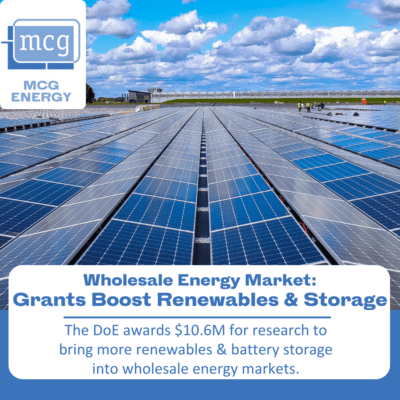
Reliable and affordable energy is necessary for domestic consumers and businesses alike, and the nation’s power grids are evolving to meet the growing demand for clean and reliable power. Integrating renewable sources like solar and wind is crucial, and innovative solutions are needed to ensure grid stability during peak periods. The Department of Energy (DoE) Wholesale Electricity Market Studies and Engagement Program is funding grants to address these challenges.
Challenges of Integrating Renewables and Battery Storage into Wholesale Markets
The current design of wholesale energy markets presents challenges when integrating renewables and battery storage, or Distributed Energy Resources (DERs). These challenges include:
- Market Design: Existing market structures may not adequately account for the variable nature of renewable energy sources like solar and wind.
- Grid Flexibility: Integrating DERs requires a more flexible grid that can accommodate fluctuations in power generation. The April 2024 solar eclipse, while not causing a major issue, highlights the growing concern for enhanced grid flexibility.
To address these challenges, the US Department of Energy announced $10.6 million in grants for projects to help improve the efficiency and flexibility of wholesale electricity markets. The recipients include Pennsylvania State University (Penn State), the National Association of State Energy Officials (NASEO), Cornell University, Western Power Pool (WPP), University of Texas at Arlington, and the Electric Power Research Institute (EPRI).
Penn State Study Will Address Energy Market Design Challenges
Among these grants, the DOE is awarding Penn State $816,000 for a study to identify market design changes that will efficiently integrate storage batteries and renewables while maintaining reliability. The Independent System Operator of New England (ISONE) and PJM are collaborating with Penn State on this initiative.
“The current operational structure, designed for instant response in five-minute increments, now necessitates forward thinking up to twelve hours ahead,” said Mort Webster, Professor of Energy Engineering at Penn State and the study’s Principal Investigator. “This is a pressing concern shared by regional transmission organizations like PJM and ISO-NE.” The project will use a simulation model to evaluate a range of market design changes and to quantify the trade-offs needed to bring more of these DERs into wholesale market power pools.
Many of these changes are being driven by Order 2222 from the Federal Energy Regulatory Commission (FERC) to facilitate participation of DERs in wholesale electricity markets. MCG Energy is working to ensure MCG applications will be ready for the changes wholesale markets are making to include more battery storage and renewables.
The Future of Wholesale Energy Markets: Increased Efficiency and Flexibility
By integrating more renewables and storage, wholesale energy markets can become more efficient and flexible. This research, and industry efforts like MCG Energy software, contribute to a more reliable solution for utilities, government entities, and businesses.
MCG Energy’s Proactive Approach to Wholesale Market Updates
Following FERC Order 2222, MCG Energy is enhancing the MCG Energy Software Suite to accommodate the changes North American ISOs and RTOs are making to fulfill FERC’s order to include more battery storage and renewables (DERs) into wholesale electricity markets. MCG Energy’s applications will be ready to fulfill these requirements for these resources before ISO/RTO markets go live with these changes.
Contact MCG Energy today to learn how our software will help you meet increasing energy demands, and the need for battery storage and renewables (DERs).

David Peterson, Ph.D. is the content specialist for MCG Energy Solutions.
